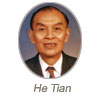AWARDEE OF TECHNOLOGICAL SCIENCES PRIZE
WANG ZESHAN
Abstract
Prof. Wang Zeshan, a specialist of energetic materials, was born in Jilin, Jilin Province in October, 1935. He graduated from the Second Department of Harbin Military Institute of Technology in 1960. He is now a prof. of Nanjing University of Science and Technology, a supervisor of doctoral candidates, and the chief engineer of the Research Institute of Propellent Charge Technology.
He has made important contributions to the development of both education and research in energetic materials.
During 1985 to 1990, he successfully solved many key technical problems to the reuse of waste energetic materials. Waste energetic materials are dangerous, toxic pollutant sources. It is harmful to people and environment. Early traditional methods of disposal of these materials involved deep water or ocean dumping and open-pit burning which are now prohibited by international regulations. Through extensive studies conducted in recent years, he established a new systematic procedures for the recovery and/or reuse of the waste energetic materials.
From 1990 to 1995, He established a new principal of compensation for the propellant combustion, and solved the problem in the stability of energetic materials during the long term storage. Thus, one of the most difficult technical problems in the history of propellants has been overcome. The technology can diminish or basically eliminate the effect of the ambient temperature on the firing and greatly increase the energy efficiency.
Prof. Wang has got a series of important theoretical achievements in the field of propellant charge technology. He is the author of 8 books and more than 70 papers, the owner of 17 patents. His theoretical achivements involve issues such as the charge design, performance, combustion processes, charge loading principal and experimental methods of propellants.
Under his instructions, 25 doctoral and 21 masters students have graduated.
He won the first National Award of Invention in 1996, the first National Award of Scientific and Technological Progress in 1993. He also won 8 awards of the Provincial and Ministrial levels.






